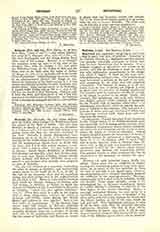

Bethulia (Gr., betuloua), the city whose deliverance by Judith, when besieged by Holofernes, forms the subject of the Book of Judith. The view that Bethulia is merely a symbolic name for Jerusalem or a fictitious town, has met with little favor, even among those who deny the historical character of the book. Bethulia is clearly distinguished from Jerusalem (iv, 6; xi, 14, 19; xv, 5, 8; the references throughout the article being to the fuller Greek text), and the topographical details leave no doubt that the story, even if it be only a pious romance, is connected with a definite place. Its site, however, is in dispute. Beside Sanur, Mithiliyeh, or Misiliyeh, Tell Kheibar and Belt-Ilia, which have divided opinion for some time, Haraiq el-Mallah, Khirbet Sheikh Shibel, el-Barid and Sichem (Bethulia being considered a pseudonym) have recently been proposed as sites of Bethulia.
The city was situated on a mountain overlooking the plain of Jezrael, or Esdrelon, and commanding narrow passes to the south (iv, 6, 7; vi, 11-13); at the foot of the mountain there was an important spring, and other springs were in the neighborhood ( vi, 11; vii, 3, 7, 12). Moreover it lay within investing lines which ran through Dothain, or Dothan, now Tell Dothan, to Belthem, or Belma, no doubt the same as the Belamon of viii, 3, and thence to Kyamon, or Chelmon, “which lies over against Esdrelon” (vii, 3). These data point to a site on the heights west of Jenin (Engannim), between the plains of Esdrelon and Dothan, where Haraiq, Kh. Sheikh Shibel, and el-arid lie close together. Such a site best fulfils all requirements. It lies between lines drawn from Tell Dothan to Bel’ema, probably Belma, or Belamon, and from the latter to el-Yamtln, probably Kyamon; there are a number of springs and wells in the neighborhood, and near by are the two passes of Kefr Adan and Burqin, so narrow in places that two horsemen cannot ride abreast. One of the three above-named places is in all probability the site of ancient Bethulia. The other sites are all deficient in some essential requirement.
F. BECHTEL

